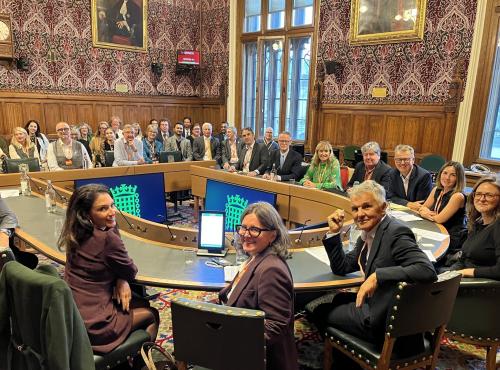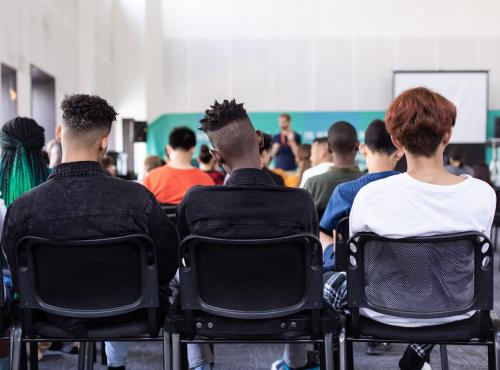Heavy lifting still required for the Levelling Up White Paper – Opportunities for the Further and Higher Education sectors
Government strategy has stretched but not yet reached beyond the ‘silos of Whitehall’ with its recently launched White Paper on Levelling Up the United Kingdom. There is still an opportunity for pragmatic stakeholders in Further Education and Higher Education to emphasise the initiatives and coordinated policy work needed to tackle geographic inequalities.
Policy Connect, with its mission to create better public policy, reached out to our network and asked what's next for Further Education (FE) and Higher Education (HE) after the launch of the White Paper on Levelling Up. One month on, we found pragmatic engagement on the policy direction of the White Paper and, critically, where policy should go further.
Mayor of Greater Manchester Andy Burnham told us at the recent Policy Connect roundtable on Levelling Up the North West that there is both mutual understanding with the Cabinet Office and more work needed to ‘break the silos of Whitehall’ to implement policy redressing geographic inequality.
Expert opinion across the skills and careers sector echoed this assessment at the latest All-Party Parliamentary Group for Skills, Careers, and Employment (APGSCE) meeting looking at what’s next for levelling up. Amongst this group, the White Paper’s unique 2030 mission centring skills and the shift towards a place-based approach were seen as welcome overarching policy to address the current and forecasted demand for high quality skills within a locality.
The White Paper’s absence of detailed policy prescriptions or centrally prescribed interventions on skills are themselves an opportunity for the Further and Higher Education sectors to step up and provide specific evidence from experience and pragmatic analysis of policy implications. Our interactions with stakeholders have shown that there is an appetite for pragmatic, cross-party engagement, starting from problem identification and conceptual framing right the way through to winning examples of meaningful engagement with partners:
-
Members like Rosa Wilkinson (High Value Manufacturing Catapult) asked the APGSCE meeting how the Government intends to join-up the various legacy localised interventions with divergent organisational mandates and territorial boundaries upon which the implementation of the Levelling Up strategy relies.
-
Smita Jamdar (Shakespeare Martineau) noted that while identifying the key capitals essential to addressing geographic inequalities, the White Paper devolved the long-term strategic commitment to address those deficits within the hands of local organisations and government. The partnerships, including meaningful and sustained engagement with a wider variety of businesses, would need to be concerted and complementary.
-
Jan Ellis (Qdos Education, representing the Career Development Policy Group) noted that this level of systems change required to address the challenges in changes to the labour workforce composition was not addressed within the White Paper.
-
On the interrelations between elements of the Levelling Up White Paper, Elena Wilson, Edge Foundation, highlighted the consequent effects of localised economic development on ameliorating regional health inequalities.
-
Graham Razey OBE (EKC Group) and Smita made a strong case for meaningful, sustained engagement with employers and the anchoring of institutional relationships in local FE providers entrusted by their communities to deliver the promises of the 2030 skills mission.
-
Elena noted the focus within the White Paper on Level 3 qualification reform, without a focus on pathways into and out of those qualifications.
-
Graham also noted that key challenges around apprenticeships, and funding of skills reform locally, were also areas where further work is necessary to develop the opportunities the White Paper proposed. Policy Connect is investigating reform of Level 4 and 5 Higher Technical qualifications in the first half of 2022.
On Higher Education, Mayors Andy Burnham for Greater Manchester and Steve Rotheram for the Liverpool City Region advocated for the success of their respective visions for regional development as the collaboration of networked local partners centred around universities as sites of civic engagement and innovation.
Providing evidence for these case studies, HE stakeholders who work in both regions highlighted the value of direct and sustained community engagement to support the embeddedness of knowledge, learning, and innovation hubs such as those at Salford University and the Liverpool School of Tropical Medicine in Greater Manchester and Liverpool, respectively. Mayors Burnham and Rotheram jointly concluded that the continued rise of the North West and Levelling-Up of other regions required central government confidence in the extension of English devolution. Policy Connect’s Higher Education Commission report on the role of universities in boosting regional economies, Empowering Innovation, is launching on 10 March.
Stakeholders with a focus on further and higher education rightly take a critical view of the White Paper on Levelling Up, particularly given the anticipation surrounding its potential impact. However, we have seen that there is a consensus opinion, across a wide variety of positions in FE and HE, on the opportunities to engage Government for a dynamic, whole-of-government approach to regional and local development as the White Paper takes legislative form.
Going forward, Policy Connect’s commitment to better public policy with stakeholders in FE and HE will be to instrumentalise the collection of evidence and elevate its prominence and impact for FE and HE with a broad group of cross-party actors. We encourage you to stay engaged in the moment with a view to its future implications - Contact Richard Stewart, Head of the Education & Skills team (richard.stewart [at] policyconnect.org.uk (richard[dot]stewart[at]policyconnect[dot]org[dot]uk)).




